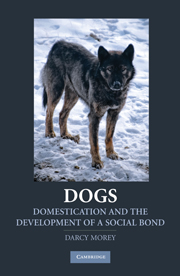Book contents
- Frontmatter
- Contents
- List of Figures and Tables
- Foreword
- Preface and Acknowledgments
- 1 Preamble to the Dog's Journey through Time
- 2 Immediate Ancestry
- 3 Evidence of Dog Domestication and Its Timing: Morphological and Contextual Indications
- 4 Domestication of Dogs and Other Organisms
- 5 The Roles of Dogs in Past Human Societies
- 6 Dogs of the Arctic, the Far North
- 7 The Burial of Dogs, and What Dog Burials Mean
- 8 Why the Social Bond between Dogs and People?
- 9 Other Human-like Capabilities of Dogs
- 10 Roles of Dogs in Recent Times
- Epilogue: One Dog's Journey
- Appendix A
- Appendix B
- References
- Index
8 - Why the Social Bond between Dogs and People?
Published online by Cambridge University Press: 05 August 2012
- Frontmatter
- Contents
- List of Figures and Tables
- Foreword
- Preface and Acknowledgments
- 1 Preamble to the Dog's Journey through Time
- 2 Immediate Ancestry
- 3 Evidence of Dog Domestication and Its Timing: Morphological and Contextual Indications
- 4 Domestication of Dogs and Other Organisms
- 5 The Roles of Dogs in Past Human Societies
- 6 Dogs of the Arctic, the Far North
- 7 The Burial of Dogs, and What Dog Burials Mean
- 8 Why the Social Bond between Dogs and People?
- 9 Other Human-like Capabilities of Dogs
- 10 Roles of Dogs in Recent Times
- Epilogue: One Dog's Journey
- Appendix A
- Appendix B
- References
- Index
Summary
… dogs are not just a silly version of the wolf…. Instead, dogs have adapted specifically to their new and unique habitat – namely, human societies.
Kaminski 2008: 211Indeed they aren't and indeed they have. Given those points, the indepth consideration of the routine burial of dogs (Chapter 7), by people who apparently thought of dogs as something other than just silly wolves, seems to lead directly to the question posed by this chapter's title. And in addressing that question, the focus shifts well beyond the archaeological realm, and squarely into the province of biology and physiological psychology, including neuroscience. By way of initial background, some notable scholars have offered relevant guidance and insights. For example, some half a century ago, Konrad Lorenz (1954: 85; 1975: xii) suggested that among animals, dogs are most like people in their capacity for true friendship. And well before that, Charles Darwin's own cousin, Francis Galton, recognized this capacity of dogs: “The animal which above all others is a companion to man is the dog, and we observe how readily their proceedings are intelligible to each other” (Galton 1973: 187). In more recent times, Wolfgang Schleidt (1998: 2; Schleidt & Shalter 2003: 59) has noted that they exceed even our close phylogenetic relatives, chimpanzees, in this capacity.
- Type
- Chapter
- Information
- DogsDomestication and the Development of a Social Bond, pp. 188 - 207Publisher: Cambridge University PressPrint publication year: 2010
- 1
- Cited by



